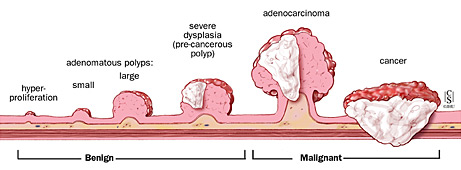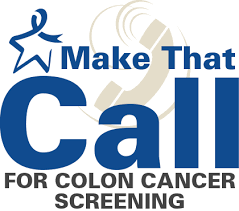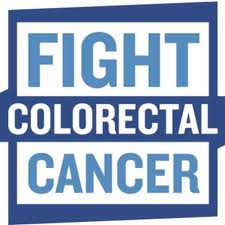Colorectal cancer
What is Colorectal cancer? Colorectal cancer is a term used for cancer that starts in the colon or rectrum. These cancers can also be reffered to, seperately as colon cancer or rectal cancer , depending on where it starts. Colon cancer and rectal cancer have many features in common. They are discussed together in this document except for the section about treatment.
Start and Spread of Colorectal cancer
If cancer forms in a polyp, it can eventually begin to grow into blood vessels or lymph vessels. Lymph vessels are thin, tiny channels that carry away waste and fluid. They first drain into nearby lymph nodes, which are bean shaped structures containing immune cells that help fight against infections. Once cancer spreads into blood or lymph vessels, they can travel to nearby lymph nodes or to a distant parts of the body such as the liver. When cancer spreads to distant parts of the body it is called metastasis.
Can Colorectal cancer be found early?
Screening is the best way to find colorectal cancer early, because it looks for cancer in people who don't have any symptoms. In many cases, these tests can find colorectal cancers at an early stage and can improve treatment results. Screening tests can also help prevent some colorectal cancers by allowing doctors to find and remove polyps that might go and become cancer. Screening tests for colorectal cancer include:
- Fecal occult blood test also known as the "FOB" and fecal immunochemical: Samples of stool are checked for blood
- Sigmoidoscopy: A flexible, lighted tube is put into the rectum and lower colon to check for polyps and cancer.
- Colonoscopy: A longer, flexible tube is used to look at the entire colon and rectum.
- Double contrast barium enema: This is an x-ray test of the colon and rectum.
- CT colonography: This is a type of CT scan of the colon and rectum.
What are the risk factors for colorectal cancer?

While we do not know the exact cause of most colorectal cancers, but we do know some risk factors. A risk factor is something that affects a person's chance of getting a disease. Some risk factors, like smoking, can be controlled. Others, such as a person's age, can't be changed.
But risk factors don't tell us everything. Having a risk factor, or even several, does not mean that you will get the disease. Some people who get colorectal cancer may not have any known risk factors. Even if a person with colorectal cancer has a risk factor, it is often very hard to know what part that risk factor may have played in the development of the disease.
Researchers have found some risk factors that may increase a person's chance of getting polyps or colorectal cancer. risk factors are links to what you do in a daily basses.
But risk factors don't tell us everything. Having a risk factor, or even several, does not mean that you will get the disease. Some people who get colorectal cancer may not have any known risk factors. Even if a person with colorectal cancer has a risk factor, it is often very hard to know what part that risk factor may have played in the development of the disease.
Researchers have found some risk factors that may increase a person's chance of getting polyps or colorectal cancer. risk factors are links to what you do in a daily basses.
Fruits and Vegetables
A healthy diet is very important for a person with Colorectal cancer. By following these easy guide lines you will live a much better and healthy life style, with much more energy.
1. Eat plenty of brightly colored fruits and vegetables
2. Eat fresh fish 1-3 times per week
3. Limit consumption of red meat
4. Avoid excess salt and saturated fats
5. Maintain a healthy weight and keep
physically active
6. Limit alcohol consumption
7. Avoid tobacco in any form
1. Eat plenty of brightly colored fruits and vegetables
2. Eat fresh fish 1-3 times per week
3. Limit consumption of red meat
4. Avoid excess salt and saturated fats
5. Maintain a healthy weight and keep
physically active
6. Limit alcohol consumption
7. Avoid tobacco in any form
Questions you may want to ask your doctor

- Would you please write down the exact kind of cancer I have.
- Where is my cancer?
- Has it spread beyond the place where it began?
- What is the stage of my cancer, and what does that mean in my case?
- Are there other tests that need to be done before we can decide on treatment?
- What treatment choices do I have?
- What treatment do you suggest and why?
- How long will treatment last? What will it involve? Where will it be done?
- How will I pay for treatment? Will my insurance cover it? need after treatment?
References
"Colorectal Cancer." Colon/Rectum Cancer. American Cancer Society, 1 Jan. 2014. Web. 12 Dec. 2014. .
"Capital District Colon & Rectal Surgery | Albany, NY 12208." Capital District Colon & Rectal Surgery | Albany, NY 12208. 1 Jan. 2014. Web. 12 Dec. 2014. . published: Capital District and Colon Rectal
"Fight Colorectal Cancer: A Rebranding Tale." Judi Sohn. Judi Sohn, 6 Mar. 2005. Web. 12 Dec. 2014. .
"Staging of Colorectal Cancer." Johns Hopkins, 1 Jan. 2001. Web. 12 Dec. 2014. .
"Capital District Colon & Rectal Surgery | Albany, NY 12208." Capital District Colon & Rectal Surgery | Albany, NY 12208. 1 Jan. 2014. Web. 12 Dec. 2014. . published: Capital District and Colon Rectal
"Fight Colorectal Cancer: A Rebranding Tale." Judi Sohn. Judi Sohn, 6 Mar. 2005. Web. 12 Dec. 2014. .
"Staging of Colorectal Cancer." Johns Hopkins, 1 Jan. 2001. Web. 12 Dec. 2014. .

